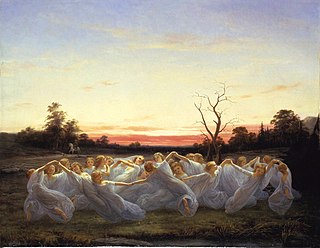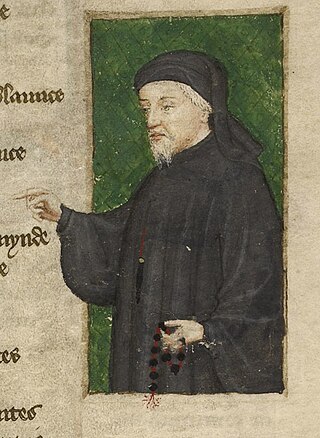Related Research Articles

An elf is a type of humanoid supernatural being in Germanic folklore. Elves appear especially in North Germanic mythology, being mentioned in the Icelandic Poetic Edda and Snorri Sturluson's Prose Edda.

Geoffrey Chaucer was an English poet, author, and civil servant best known for The Canterbury Tales. He has been called the "father of English literature", or, alternatively, the "father of English poetry". He was the first writer to be buried in what has since come to be called Poets' Corner, in Westminster Abbey. Chaucer also gained fame as a philosopher and astronomer, composing the scientific A Treatise on the Astrolabe for his 10-year-old son Lewis. He maintained a career in the civil service as a bureaucrat, courtier, diplomat, and member of parliament.

Sir Gawain and the Green Knight is a late 14th-century chivalric romance in Middle English. The author is unknown; the title was given centuries later. It is one of the best-known Arthurian stories, with its plot combining two types of folk motifs: the beheading game, and the exchange of winnings. Written in stanzas of alliterative verse, each of which ends in a rhyming bob and wheel; it draws on Welsh, Irish, and English stories, as well as the French chivalric tradition. It is an important example of a chivalric romance, which typically involves a hero who goes on a quest which tests his prowess. It remains popular in modern English renderings from J. R. R. Tolkien, Simon Armitage, and others, as well as through film and stage adaptations.

John Gower was an English poet, a contemporary of William Langland and the Pearl Poet, and a personal friend of Geoffrey Chaucer. He is remembered primarily for three major works, the Mirour de l'Omme, Vox Clamantis, and Confessio Amantis, three long poems written in French, Latin, and English respectively, which are united by common moral and political themes.
Fairies, particularly those of Irish, English, Scottish and Welsh folklore, have been classified in a variety of ways. Classifications – which most often come from scholarly analysis, and may not always accurately reflect local traditions – typically focus on behavior or physical characteristics.

The General Prologue is the first part of The Canterbury Tales by Geoffrey Chaucer. It introduces the frame story, in which a group of pilgrims travelling to the shrine of Thomas Becket in Canterbury agree to take part in a storytelling competition, and describes the pilgrims themselves.
Pierce the Ploughman's Crede is a medieval alliterative poem of 855 lines, lampooning the four orders of friars.

Celtic literature is the body of literature written in one of the Celtic languages, or else it may popularly refer to literature written in other languages which is based on the traditional narratives found in early Celtic literature.

In folklore and literature, the Fairy Queen or Queen of the Fairies is a female ruler of the fairies, sometimes but not always paired with a king. Depending on the work, she may be named or unnamed; Titania and Mab are two frequently used names. Numerous characters, goddesses or folkloric spirits worldwide have been labeled as Fairy Queens.
The rash promise is a common motif in medieval and folk literature, especially fairy tales. It was also termed a blind promise or rash boon. It is classified in the Motif-Index of Folk-Literature as motif M223 and likely has an Oriental origin.
Laura Howes is an American scholar of Middle English literature. She is the author of Chaucer's Gardens and the Language of Convention (1998) and the editor, with Marie Borroff, of the Norton Critical Edition of Sir Gawain and the Green Knight (2010). Howes received her B.A. from Cornell University and her M.A. and Ph.D. from Columbia University, and is Professor of English at the University of Tennessee.
William of Blois was a French medieval poet and dramatist. He wrote at least one poetical work, which has not survived, as well as some dramas. Two other works that survive are credited to him, but it is not clear if he was actually the author. He also was an abbot of a monastery in Calabria in southern Italy, after being an unsuccessful candidate for the Bishopric of Catania in Italy.
John Patrick ("Pat") Hermann is an American academic who specializes in Old English poetry; he is an emeritus professor at the University of Alabama. He is the author of Allegories of War: Language and Violence in Old English Poetry (1989), and an early proponent of the application of postmodern critical theory to Old English poetry, especially allegorical poems, to investigate the "intersection of spirituality and violence". The book was marked as a "turning-point in criticism of Old English poetry". Hermann is also a well-known critic of the Greek system at the University of Alabama, described by one journal as leading a "one-man crusade...to abolish what he calls an 'apartheid greek system'".
Jane Chance, also known as Jane Chance Nitzsche, is an American scholar specializing in medieval English literature, gender studies, and J. R. R. Tolkien. She spent most of her career at Rice University, where since her retirement she has been the Andrew W. Mellon Distinguished Professor Emerita in English.
Allen J. Frantzen is an American medievalist with a specialization in Old English literature. Since retiring from Loyola University Chicago, he has been an emeritus professor.
Constance Bartlett Hieatt was an American scholar with a broad interest in medieval languages and literatures, including Old Norse literature, Anglo-Saxon prosody and literature, and Middle English language, literature, and culture. She was an editor and translator of Karlamagnús saga, of Beowulf, and a scholar of Geoffrey Chaucer. She was particularly known as one of the world's foremost experts in English medieval cooking and cookbooks, and authored and co-authored a number of important books considered essential publications in the field.
Thorlac Francis Samuel Turville-Petre is an English philologist who is Professor Emeritus and former head of the School of English at the University of Nottingham. He specializes in the study of Middle English literature.
Laura Alandis Hibbard Loomis was an American literary scholar and college professor who specialized in medieval English literature.
Eleanor Prescott Hammond (1866–1933) was an American scholar of English literature, particularly Chaucer studies. She studied at Oxford under Arthur Sampson Napier, earning her B.A. in 1894. She obtained a Ph.D. at the University of Chicago in 1898, then taught there in the English department before leaving to become a schoolteacher and independent scholar. She also taught at Wellesley College.
Emily Steiner is the Rose Family Endowed Chair Professor of English at the University of Pennsylvania. She is known for her work on medieval literature and middle English literature and culture.
References
- ↑ Houghton, Helen S. (1984). "Rev. of Green, Poets and Princepleasers". Comparative Literature . 36 (1): 85–87. doi:10.2307/1770334. JSTOR 1770334.
- ↑ Schmidt, A. V. C. (1983). "Rev. of Green, Poets and Princepleasers". The Review of English Studies . New Series. 34 (133): 52–53. JSTOR 517157.
- ↑ Bornstein, Diane (1981). "Rev. of Green, Poets and Princepleasers". Speculum . 56 (4): 874–76. doi:10.2307/2847382. JSTOR 2847382.
- ↑ Rosenthal, Joel T. (1985). "Kings, Courts, and the Manipulation of Late Medieval Culture and Literature: A Review Article". Comparative Studies in Society and History . 27 (3): 486–93. doi:10.1017/s0010417500011555. JSTOR 178710.
- ↑ Lenaghan, R. T. (1983). "Chaucer's Circle of Gentlemen and Clerks". The Chaucer Review . 18 (2): 155–60. JSTOR 25093873.
- 1 2 Pearsall, Derek (2004). "Medieval Literature and Historical Enquiry". Modern Language Review . 99 (4): xxxi–xlii. doi:10.2307/3738608. JSTOR 3738608.
- ↑ Secchi, Gustavo P. (2000). "Rev. of Green, A Crisis of Truth". Albion . 32 (2): 277–79. doi:10.2307/4053778. JSTOR 4053778.
- ↑ Fowler, Elizabeth (2003). "Rev. of Green, A Crisis of Truth". Speculum . 78 (1): 179–82. doi:10.1017/S0038713400099310. JSTOR 3301477.
- ↑ Time and Mind, 10 (2017): 229.